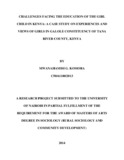| dc.description.abstract | The study sought to investigate the challenges of girl child education in Tana River County. The specific objectives thereof were: to establish the social and cultural factors affecting the enrolment of girls in primary schools; to establish the factors which cause school drop-out among girls; to establish whether the school environment is friendly to girls and supports their education; and to examine the role of socio-economic factors affecting girls‟ education.
The study used the descriptive survey research design to study the factors affecting girls‟ education in TRC. The study‟s sample size was 225 girls; 15 girls from 15 schools in the county. The researcher managed to interview 171 girls; a 76% response rate. The research concentrated in girls in classes 7 and 8 who were able to articulate issues better, have experienced dropping out of school and subsequent re-entry. The selection of the schools for interviewing was done through stratified sampling while the girls were selected through systematic sampling. Collection of data was done via questionnaires, individual interviews and focus group discussions while the analysis of the data was done using Statistical Package for Social Sciences (SPSS). In the resultant analysis pie-charts, frequency tables and bar graphs were used to present the quantitative data.
The research‟s findings indicated that early marriages, sexual harassment, inadequate teachers and learning materials are among the factors that affect girl child education. Others include childhood pregnancies, child labour, and retrogressive cultural practices. It was also discerned that awareness on the importance of education through mentoring, provision of adequate learning materials and facilities, and school feeding programs would greatly improve on the retention of the girl child in school.
In order to counter the above it is recommended that among others, practices that encourage early pregnancies be condemned while the economic factors which bring about poverty be addressed through economic empowerment of the community. Other measures include the elimination of cultural practices which are retrogressive and the communal addressing of the pestering issues of early pregnancies, school dropout and the resultant poor performance in school. Further research should be conducted to establish a working framework of all stakeholders to address girls‟ school dropout and poor performance in TRC as well as on how to eliminate retrogressive cultures that affect girls‟ education countrywide. | en_US |

